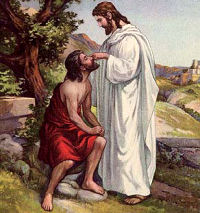“Get up, he is calling you.” (Mark 10:49)
Today’s readings all involve a call from God. In the first reading, the Lord makes a joyful announcement, calling his people out of captivity and back to Jerusalem. He promises to rescue them and accompany them along the way, leaving no one behind. He is preparing the way for a new covenant, and he wants all his people to join him. In the second reading, God calls his Son to the high priesthood as the One who offers forgiveness and whose self-offering shows us the way to our heavenly Jerusalem.
Finally, in the Gospel, Jesus makes another announcement of hope on the road to Jerusalem. He calls Bartimaeus, a blind beggar, to his side. Jesus has come to rescue his people. He will leave no one behind, not even this blind man— and not even us! Finally, the hour has come as Jesus, the great high priest, walks to the place of his Passover sacrifice and offers a new covenant in his own blood.
As their paths converge, Jesus asks Bartimaeus: “What do you want me to do for you?” (Mark 10:51). Likewise, Jesus asks you: “What do you want of me?” He longs to see you throw aside anything that limits your vision and your expectations. Jesus has marvelous plans for your life. He wants to heal your heart and fill it with the fire of his love.
Are your aspirations limited, or are they worthy of a royal destiny? If not, toss them aside and cry out, Son of David, have pity on me! Don’t give up because of obstacles and difficulties. Persist. Jesus will remove what needs to be removed, strengthen what needs to be strengthened, and give you the grace to get up and follow.
It’s not where you’ve come from but where you are heading that counts—the heavenly Jerusalem! If you only knew how much he loves you! So take courage and get up. He is calling you!
“Jesus, Son of David, have pity on me! I want to see!”
Jeremiah 31:7-9; Psalm 126:1-6; Hebrews 5:1-6
Questions for Reflection or Group Discussion
1. In the first reading, the prophet Jeremiah urged the people of God to exult and shout joyfully over what God had accomplished for them: “The Lord has delivered his people” (Jeremiah 31:7). What has the Lord done in your life that causes you to gratefully and joyfully exalt Him?
2. The Responsorial Psalm again repeats the theme that God’s people should be filled with joy - more than joy, laughter - because the Lord has delivered his people from captivity and “has done great things for us.” St. Augustine said that a Christian should be an alleluia “from head to foot”. In what way is your relationship with Jesus Christ a source of joy for you? What steps can you take to deepen that relationship?
3. The second reading from the Letter to the Hebrews describes the difference between the Jewish high priest and Jesus Christ, our High Priest. What are some of these differences? Why do these differences have such an impact on the effect of the sin offering of the Jewish high priests compared to Jesus’ offering of himself for our sins (see Hebrews 9:13-14)? Do you believe reflecting on these truths, as you prepare to receive the Eucharist at Mass, can make a difference in its impact on your life? Why or why not?
4. In the Gospel, we hear of Bartimaeus the blind man, who “kept calling out” beseeching help from Jesus even when advised by the disciples to keep quiet? How persistent (and consistent) are you in prayer? What can you do to eliminate those things that keep you from a time of prayer each day? How can you deepen your expectancy?
5. Also in the Gospel, Jesus says to Bartimaeus, “What do you want me to do for you?” How would you respond if Jesus asked you this same question? Would you be able to respond with the same expectant faith that Bartimaeus had? When you call out to God in prayer for your needs do you believe that he will answer you? Why or why not?
6. The meditation ends with these words: “Are your aspirations limited, or are they worthy of a royal destiny? If not, toss them aside and cry out, Son of David, have pity on me! Don’t give up because of obstacles and difficulties. Persist. Jesus will remove what needs to be removed, strengthen what needs to be strengthened, and give you the grace to get up and follow. It’s not where you’ve come from but where you are heading that counts—the heavenly Jerusalem! If you only knew how much he loves you! So take courage and get up. He is calling you!” How would you describe the “obstacles and difficulties” that keeps you from wholeheartedly saying yes to the Lord’s call and plan for your life? What steps can you take to overcome them?
7. Take some time now to pray and ask the Lord to open your eyes to see more clearly his great love for you, and his “marvelous plans for your life.” Use the prayer at the end of the meditation as the starting point.












